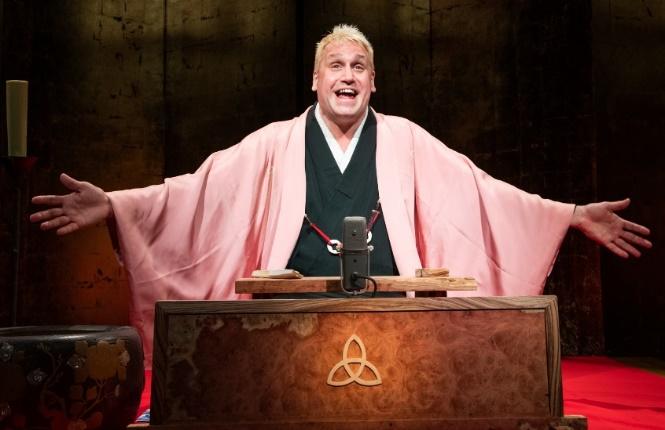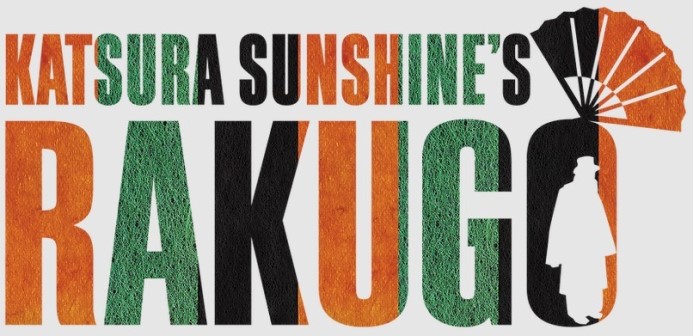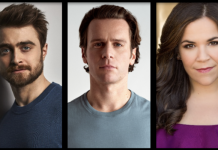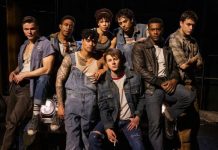In 1999, Katsura Sunshine – born Gregory Robic in Toronto, Canada, to parents of Slovenian origin – went to Japan to pursue studies in Japanese theater. In 2008, he began a strict three-year apprenticeship in Rakugo – the 400-year-old art of comic storytelling that developed during the Edo Period – and became the first-ever Western Master in the history of the Osaka-based “Kamigata” Rakugo tradition and one of only 800 Rakugo Masters in the world. His obsession with Japanese culture, language, and comedy led him to create the one-man show Katsura Sunshine’s Rakugo, which debuted in London in 2017, and is now playing an extended return NYC engagement through the end of 2024, Off-Broadway (not on Broadway, as he and his website mistakenly state) at New World Stages, following its pandemic shutdown in 2020.

The direct-address solo piece is as much an educational lecture as it is a celebration of the traditional Japanese art of comic storytelling, with audience participation and reaction also comprising an integral part of the experience. Sunshine enters the stage, immersed in loud music and colorful swirling lights (lighting by Yuki Nakase Link), and furnished in authentic minimal style, with a background folding screen, a suspended frame of overhead lanterns, a central low platform, and candles (set design by Mikiko Suzuki MacAdams). Dressed in a traditional kimono and bleached blond hair (as advised by his Master, who also gave him the name Katsura Sunshine, so that he would look foreign enough), he begins his monologue by joking with the audience and explaining the meaning and history of Rakugo, which is performed with only a fan and hand towels as props, while kneeling on a cushion.
Speaking in both English and fluent Japanese, the ebullient fast-paced performer translates and defines many of the foreign words and phrases he uses, instructs and rehearses the house on how and when to respond favorably, and laughingly considers the major cultural differences between the two societies, including the initial difficulty he had being understood when trying to purchase hand soap, 47 ways to say “thank you” in Japan, and the seemingly endless cycle of giving and receiving compliments.
The main Rakugo segments, which Sunshine changes monthly, consist of a conversation between two or more characters, all played by the lone storyteller – who must be permitted by his Master to perform each specific tale, handed down for centuries from Master to Apprentice – and ending with a punchline. August featured “Peach Johnny” (or “Momotaro”), capturing the frustration of a father trying to put his inquisitive son to sleep with a bedtime folk tale that doesn’t have quite enough detail for the boy; and “Rotten Tofu” (or “Chiritotechin”), in which a picky and pretentious guest is fed a recipe of rotten tofu disguised as a gourmet delicacy that he claims to have eaten before and extols.

While the age-old Japanese stories, which, in signature style, tend to be a bit long and repetitive, might not be suited to a contemporary American sense of humor, the artist is enthusiastic and skilled at what he does, combining mime and readily legible facial expressions, gestures, and body language with his oral delivery, engaging the audience with his direct eye contact, and eliciting the practiced response from the crowd.
Sunshine currently divides his time between Tokyo and New York, and also continues to perform dates at the Leicester Square Theatre on London’s West End. If you’re interested in Japanese culture or in learning more about it, or if you want to revisit the comical stories of your own Japanese tradition and heritage, be sure to catch the Master and this light-hearted informative show, which helps connect his love for the East with his native West.
Running Time: Approximately 70 minutes, without intermission.
Katsura Sunshine’s Rakugo plays select Saturdays through December 14, 2024, at New World Stages, Stage 2, 340 West 50th Street, NYC. For tickets (priced at $29-51), go online. Masks are optional but strongly encouraged.






It was just announced that the show, originally scheduled through December 22, 2022, has been extended through the end of 2023.